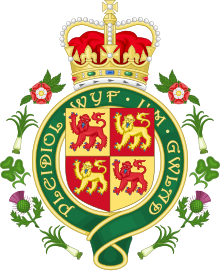An editor has performed a search and found that sufficient sources exist to establish the subject's notability. (March 2024) |
The Agricultural Land Tribunal for Wales (ALTW) is a tribunal sponsored by the Welsh Government that deal with disputes related to agricultural holdings.[1]
| Agricultural Land Tribunal for Wales | |
|---|---|
 | |
| Established | 1947 |
| Jurisdiction | Wales |
| Authorised by | Agriculture Act 1947 |
| Appeals to | Upper Tribunal (Lands Chamber) |
| Website | agriculturallandtribunal |
It is established under Section 73 of the Agriculture Act 1947, and also has powers under the Agricultural Holdings Act 1986 and Land Drainage Act 1991.[2] Its functions fall under the remit of the President of Welsh Tribunals.[3] It the oldest of the Welsh tribunals.[4]
Functions
editThe ALTW can hear disputes regarding:[5]
Proceedings
editThe majority of hearings have been held virtually since the 2020 pandemic, although many cases do not require a hearing.[6][1] Where a hearing is needed, the panel will conduct an inspection of the land involved, as well as any equipment or produce on it.[5] Judges can be cross-deployed from the other Welsh tribunals.[4]
Proceedings are regulated by the Agricultural Land Tribunal (Area) Order 1982 and the Agricultural Land Tribunals (Rules) Order 2007. They can be conducted in either English or Welsh.
The tribunal has no power to enforce the orders it makes, as this is held by the County Court.
Avenues for further appeal
editThere are two avenues for appeal of ALTW decisions:[6]
- Review by another sitting of the ALTW
- Appeal to the Upper Tribunal
Representation
editParties can choose to be represented by a lawyer, but may also use a friend or represent themselves.
Membership
editThe tribunal is led by a chairman, who is appointed by the Lord Chancellor and must have been a solicitor or barrister for at least 7 years' prior. The deputy chairmen must also be legally qualified. All can preside over hearings, and will write decisions.[7]
As of 2023, the current chairman is Dr Christopher McNall. The deputy chairmen are Tanveer Rakhim and Gareth Wilson.[5]
Other panel members do not have to be lawyers, but are still appointed by the Lord Chancellor.
The ALTW is supported by a secretariat.
Caseload
editFrom 2022 to 2023, the ALTW received:[5]
- 19 applications related to succession of a tenancy on death
- 8 applications related to a notice to quit a tenancy
- 1 application related to land drainage
See also
editReferences
edit- ^ a b "Welcome to the". The Agricultural Land Tribunal for Wales. Retrieved 2024-02-29.
- ^ "The Tribunal's powers". The Agricultural Land Tribunal for Wales. Retrieved 2024-02-29.
- ^ "The Welsh tribunals". His Majesty’s Stationery Office. 2 March 2017. Retrieved 7 January 2018.
- ^ a b Nason, Sarah; Pritchard, Huw (30 April 2020). "Administrative justice and the legacy of executive devolution: establishing a tribunals system for Wales". Australian Journal of Administrative Law. 26 (4): 233–254. ISSN 1320-7105.
- ^ a b c d "Agricultural Land Tribunal Wales Annual Report 2022 – 2023" (PDF). agriculturallandtribunal.gov.wales.
- ^ a b "Frequently Asked Questions". The Agricultural Land Tribunal for Wales. Retrieved 2024-02-29.
- ^ "Secretariat and members". The Agricultural Land Tribunal for Wales. Retrieved 2024-02-29.